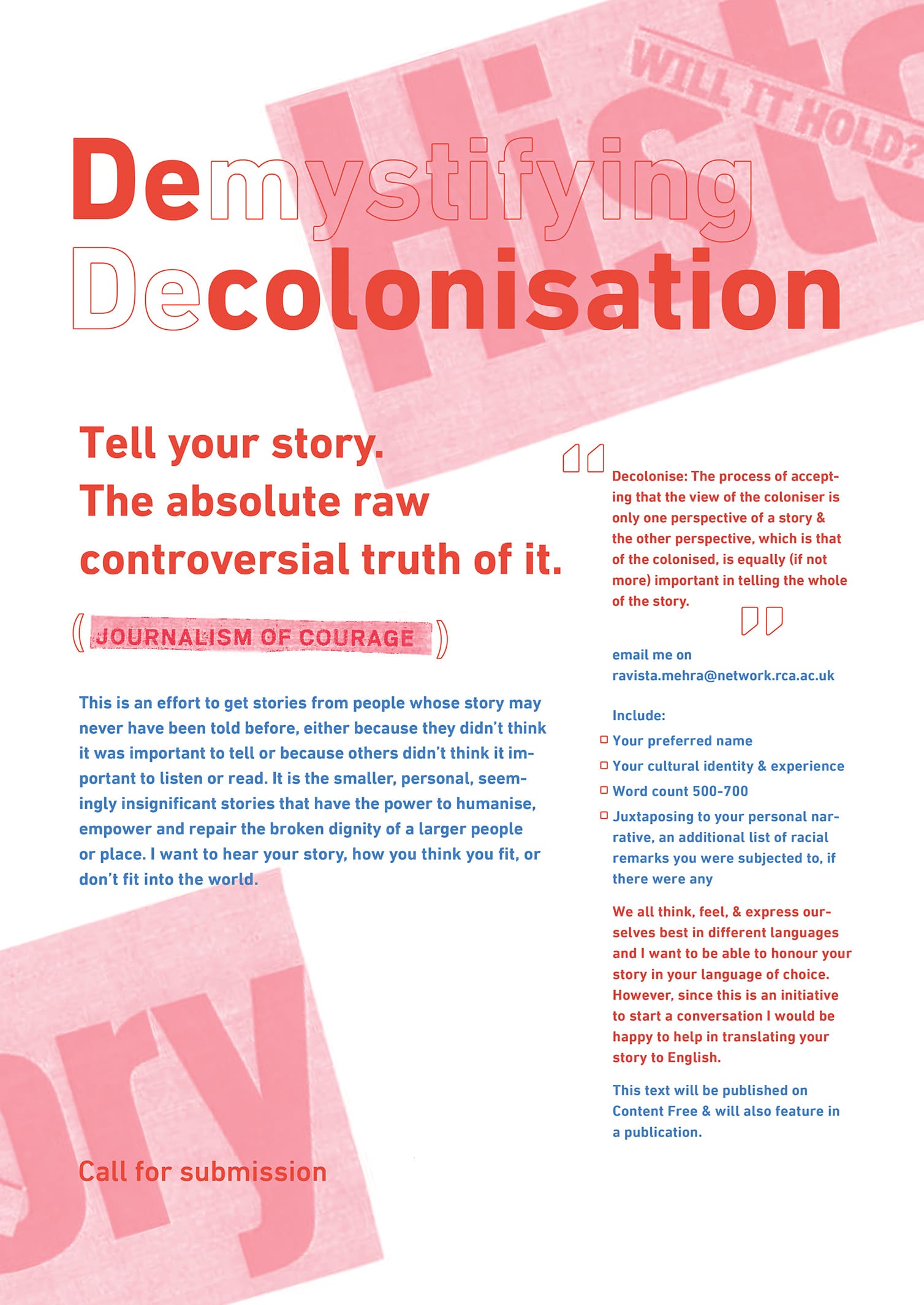


 February 12th, 2020
February 12th, 2020
 4:41 min read
4:41 min read  1289 words
1289 words
History is not our fault, but the future is our responsibility.
History — A collection of ‘stories’, written down, which form the lens of how the world is perceived and remembered.
Stories — A one-sided point of view of daily accounts that occur. Also can be fictional or non-fictional.
Decolonise — The process of accepting that the view of the coloniser is only one perspective of a story and the other perspective, which is that of the colonised, is equally (if not more) important in telling the whole story.
There is a lot of talk these days about decolonisation, especially regarding the institute and curriculum, since we are in an academic setting. However, how can we possibly tackle the massive monster that is decolonisation at such a large scale without tackling it at a personal level? In order to start the process of decolonising our history, geography, economics, literature, we have to first decolonise our own stories, which simply means looking back and reflecting on our cultural experiences growing up.
Chimamanda Ngozi Adichie says in her TED talk The Danger of a Single Story, that “the single story creates stereotypes, and the problem with stereotypes is not that they are untrue, but that they are incomplete. They make one story become the only story”. This column is an effort to get stories from people whose story may never have been told before, either because they didn’t think it was important to tell or because others didn’t think it important to listen or read. It is the smaller, personal, seemingly insignificant stories that have the power to humanise, empower and repair the broken dignity of a larger people or place.
— Ravista Mehra
Growing up in a former British colony is a special thing. When you’re born, you’re given an inferiority complex, free of charge. On the house. You will never really hide from the ever-patronizing, “Wow, your English is actually pretty good”
There’s a special way your brain malfunctions when you have the pleasure of being asked “Why does your country speak English?” from an English person. Let’s sit down for a bit boo boo because if you haven’t heard it, this story is crazy.
“That’s so weird”
“wayy-uddddd”, they repeat.
“what ya doin?”
“WAT yaa DOOOinnnn”
As if I can’t pronounce things the way they can. As if my small mind wished that “me talk pretty like you one day”.
Dance monkey dance.
It happens though. Friends that go to school in the UK and after one term think they’ve been “blessed” with a reason to speak with a posh drawl. “Wot?” “Wot Accent? :)” So ready to leave home and erase that engrained inferiority. It’s not Trinidadian creole, it’s bad English [It’s not true].
The older generation in Trinidad still masturbates to stamps of the Queen [That one’s true]. But you’re no one until you go away. To stay in Trinidad is to fail. To stay in Trinidad is to be without ambition. These are the thoughts I’m still fighting against.
Even at home we’re made to feel ashamed. “But that’s the American pronunciation, the true British way is…”.
“It’s not sidewalk, its pavement. This is because of all those American shows you grew up with”.
Colonies comparing colonies to win the favour of a country who couldn’t give less of a shit. We will always be scrappy and incorrect. The half-formed offspring of the triumphant motherland; a frankensteinian hodge-podge of the familiar and a history they’d rather forget (I hope). ProNONCeeAYshun tuh make their blood CRawwwwwwwl.
And yet right here, blooming from our fertile ground in Brixton and Peckham, the suddenly very “London” slang of saying “wagwan”, “ting” and “dat/dere”. While here at university, a Trini got told off for trying to sound “London” while just speaking normally. The Caribbean gave you human blood and y’all still stealing things?
Why is your version of my accent cool and yet mine is uneducated, when you are the ones who educated me? Going through British school systems and British university, no wonder we make you cringe – we’re just not quite right.
But as Sir Derek Walcott said, a St. Lucian writer who gained fame in the UK (as the “sir” would suggest), if poetry were a ship, then “in simple speech my common language go be the wind”.
But I look forward to those moments, when your vocal chords loosen, and slump into that easy contrapposto. When you hear a familiar melody of speech on the tube, by a woman wrapped in twice as much clothes for the cold. The wall of sound that hits you when you get to your gate at Gatwick, a little pocket of home. We still find a way to liven and light up the streets in Notting Hill every year, fighting against the grey.
Sorry if I’m not sugar-coating things, sugar was taken from Trinidad a while back.
— Mairi Millar

History is not our fault, but the future is our responsibility. History — A collection of ‘stories’, written down, which form the le...

History is not our fault, but the future is our responsibility. History — A collection of ‘stories’, written down, which form the le...